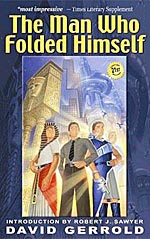
![]() Tar Daddoo
Tar Daddoo
3/26/2013
![]()
What is the Science Fiction Premise?
The Man Who Folded Himself is a very personalized story about time travel. In addition to the usual notions of time travel, this book also relies on a branching approach to history.
Is the science of the premise explored?
There is a great deal of discussion about time travel and its properties. We learn about going forward, going back, passing through, and lingering for a while. We also learn how to reverse our trajectory to undo a path with a particularly unpleasant outcome.
Is the impact of the premise on an individual explored?
There is no question that the protagonist is changed forever by traveling in time. The changes are many, and in some cases strange, but they can be traced back to the use of the time machine.
Is the impact of the premise on society explored?
The Man Who Folded Himself is a very personalized account and does not reveal any impact on society. I do think that at a more thematic level the author is trying to say something about people and society, but this is from first principles and not a consequence of the Science Fiction premise.
How well written is the story?
The writing flows and the book is actually rather short. I found the prose style difficult, however. While it began rather briskly, it eventually devolved into long passages of thoughtful ruminations rather than action, which I found somewhat dull.
Can I recommend the book?
I was disappointed by The Man Who Folded Himself. I read it because it was listed at Worlds Without End as Light/Humorous SF. Moreover, it was written by David Gerrold who wrote "The Trouble with Tribbles", one of my favorite Star Trek episodes and a truly humorous piece of Science Fiction. How could I go wrong?
The trouble was that the life being portrayed was actually very depressing. Perhaps, I was not meant to feel that way, but I did. I kept hoping the protagonist would break free of his rather claustrophobic life, but he never did. I could not see the humor in this life of self-inflicted isolation. Perhaps it was the ending that was supposed to be humorous, but, having read Heinlein, I saw that one coming from early on.
My policy is to read a novel without first reading any Introduction. In this case, it is possible that the Introduction would have helped me understand the book better. The Introduction and the Author's Note at the end of the book make it clear that this story played an important personal role for Gerrold. Having known that, I might have read the book with a different lens and seen more of what was intended to be seen.
That opportunity has passed, however, and as it is, I cannot recommend The Man Who Folded Himself. Though you might enjoy the discussion of time travel and the convoluted uses to which it is put, be prepared to wonder whether any of it was really worthwhile.
Tar Daddoo